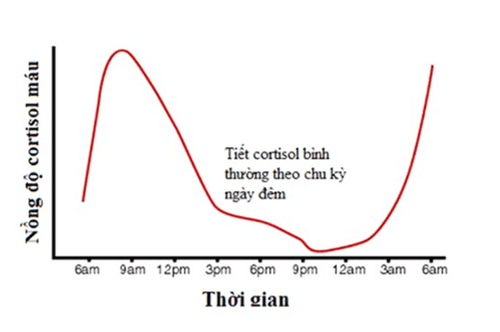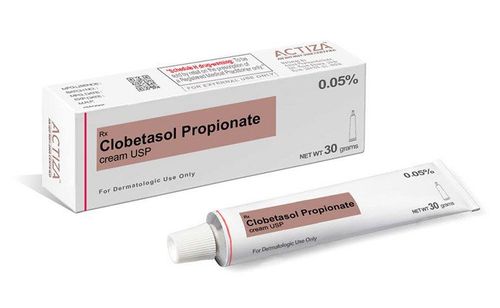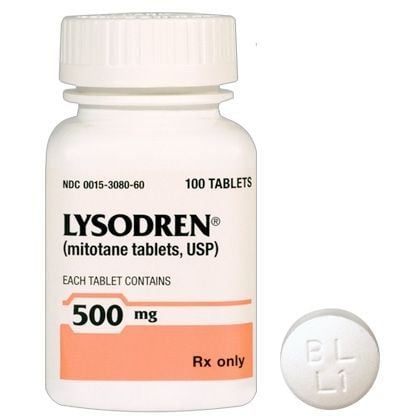This is an automatically translated article.
Cortisol is a steroid hormone produced by the adrenal glands and is also known as a stress hormone. If a person is under acute stress, the level of cortisol in the blood will rise suddenly, if then the level of cortisol remains high, it can be the cause of a number of dangerous diseases.
1. What is Cortisol?
When the human body responds to a stress, the hypothalamus secretes a hormone that causes the release of nephrotropic hormone. This hormone stimulates the anterior pituitary to secrete ACTH (adrenocorticotropic hormone). Then, ACTH again stimulates the adrenal cortex to remove cortisol to metabolize sugar. Thus, if blood cortisol levels will increase due to a counterregulatory mechanism to stimulate the pituitary gland to reduce ACTH production, this is a valuable parameter for monitoring the function of the adrenal cortex.
Cortisol has the function:

Stimulates the formation of glucose Stimulates the breakdown of the body's energy stores Helps the body use sugars and fats for energy The body uses cortisol in response to stress and dangerous situations which the body perceives by initiating sympathetic responses to stressors Reducing inflammatory and immune function Stimulating gastric acid secretion
Trắc nghiệm: Tìm hiểu về “bí mật” của các Hormone
Hormone hầu như quyết định tới toàn bộ các chức năng quan trọng của cơ thể. Nó “làm việc” miệt mài để phát tín hiệu và điều hòa sự hoạt động của các cơ quan trong cơ thể, mô cũng như tế bào nhất định. Để hiểu hơn về vai trò cũng như cách thức các hormone tác động lên cơ thể, bạn có thể làm bài trắc nghiệm sau đây.
Nguồn tham khảo: webmd.com
2. What is a blood cortisol test used for?
The blood cortisol level test checks the level of cortisol production associated with certain medical conditions such as Cushing's syndrome and Addison's disease (adrenal failure). Doctors will order a test to measure cortisol levels in the blood when a patient has symptoms suggestive of Cushing's syndrome or adrenal insufficiency as follows
Symptoms suggestive of Cushing's syndrome:
Hypertension, hyperglycemia Obesity , especially belly fat, belly skin has purple stripes Thin skin Muscle atrophy and weakness Osteoporosis

Weight loss, fatigue Muscle weakness Low blood pressure Abdominal pain Dark patches of skin
3. What is the normal value of blood cortisol levels?
Blood cortisol levels are defined as normal in the following ranges:
8 a.m. - 12 noon: 5.0-25.0 μg/dL or 138-690 nmol/L 12 noon to 20 pm: 5.0-15.0 μg/dL or 138-410 nmol/L 20 pm to 8 am: 0-10.0 μg/dL or 0-276 nmol/L Blood cortisol levels increase if crossed The above value range can be caused by a number of reasons such as:
Burns Cushing's syndrome Eclampsia Hypertension Hyperthyroidism Obesity

If cortisol levels are lower than normal, it can be due to several main causes such as:
Addison's disease (adrenal failure) Hypoglycemia Hypothyroidism Thyroid dysfunction Liver disease Postpartum pituitary necrosis
4. Factors affecting the test results of blood cortisol levels
Some factors that can cause erroneous test results include:Cortisol levels change color during exercise, sleep or stress Specimen with broken red blood cells Patients with alcohol abuse or acute medical conditions Patients using certain drugs that increase blood cortisol levels such as birth control pills, amphetamines, estrogens,... or reduce cortisol levels: androgens, barbiturates,...

Cortisol levels reflect your health and are the basis for diagnosing some dangerous diseases such as adrenal insufficiency and Cushing's syndrome. As soon as your body has unusual symptoms, you should go to a reputable medical facility for examination and advice from a doctor.
To register for examination and treatment at Vinmec International General Hospital, you can contact the nationwide Vinmec Health System Hotline, or register online HERE.













